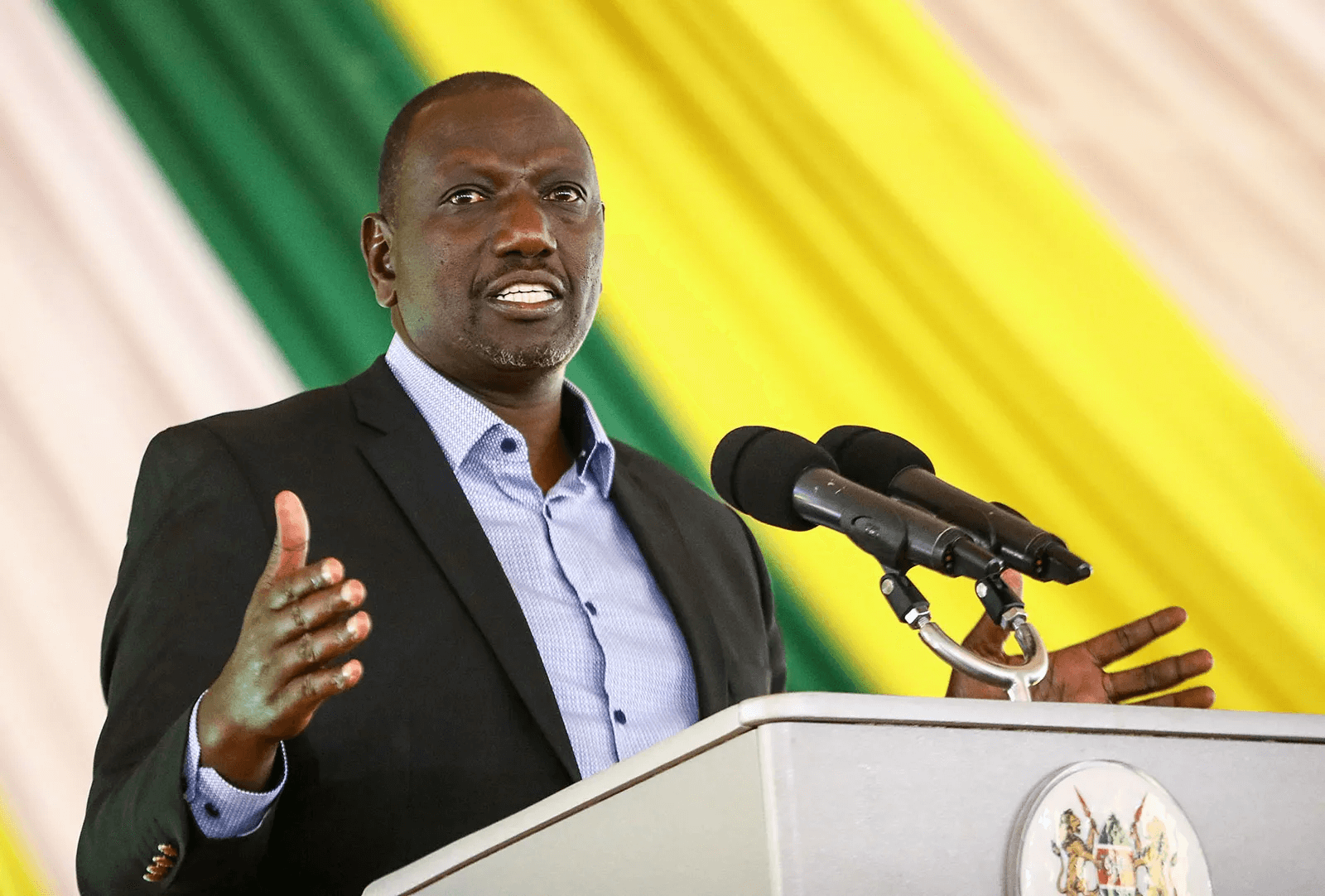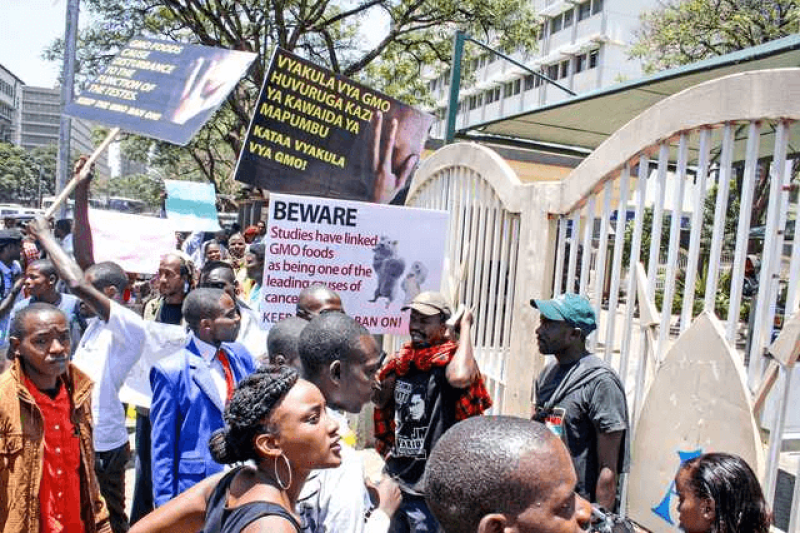The East African-wide famine and supply chain issues exacerbated by Russia’s invasion of Ukraine have reenergized the anti-GMO movement in Kenya. Within days after President William Samoei Arap Ruto lifted a 10-year ban on importation and open cultivation of GM-foods in early October, activist networks in Kenya began assembling a new alliance with ideologically-aligned politicians.
These networks were flat-footed by Dr. Ruto’s cabinet swift decision in early October. But they quickly hatched a full-throttle response, which government officials, analysts and scientists characterize as fearmongering, deceit, blackmail, vengeance, lawsuits, among other dirty tactics.
They are planning a multi-front challenge according to insiders, including court orders; demands for imposition of moratoria; street protests, demonstrations and workers’ industrial actions [strikes]; misleading farmers to confuse them to reject GM-seeds; and perpetuating the myth that food derived from GM-crops is harmful. Every major study of GM crops and food has found them to be as safe or safer than conventional or organic food, and they are approved by regulators for consumption worldwide.
High Court debate
The alliance works mostly with politicians from the opposition, lawyers, NGOs, local cultural and anti-GMO farmer-groups such as the Kenya Peasants League. It lodged a lawsuit in the High Court, opposing the importation, cultivation and consumption of GMOs, and it is still being debated.
The group alleged that the decision to lift the ban is unlawful, claiming that GMO products pose a health risk to Kenyans and that the government lifted the ban without involving Kenyans, claiming that “public participation” is required by the Constitution, according to the regional newspaper, The EastAfrican.
It is activists who identify, convince and push a group among farmers to petition court, for the cause to look genuine and for it to generate empathy, when they hear of “peasants”, the article noted.
High Court Judge Justice Mugure Thande concluded there was some merit to the filing, issuing orders suspending government’s plans to allow importation and distribution of GMOs pending determination of an earlier lawsuit against lifting the ban.
The core of anti-GMO activist grievance stems from an opposition to importing foreign-grown corn while there are large amounts of unbought locally-produced maize with Kenyan farmers. Many Kenyans want money that might go to subsidize GM corn imports to go first to buy local grains and produce.
The first lawsuit challenging the lifting of the ban was lodged by Raila Odinga’s Nairobi lawyer, Paul Mwangi. He’s challenging the government action through a separate court-petition whose hearing starts December 15. The petition claims the lift to the ban was unconstitutional and a threat to food security in Kenya.
According to The Star, Mwangi claimed ‘the ban’s lifting and importation of GMOs’ threatens the rights and freedom of Kenyans.
It goes against the right to food of acceptable quality, consumer rights guaranteed by Article 43, right to fair administrative action in article 47 and freedom of conscience, religion, thought, belief and opinion.
Background
In 2015, Nairobi-based activists demonstrated against lifting the ban, sharply criticizing then Deputy President Ruto, who is a biologist and supportive of GM crop-technology. Ruto had previously also served as Science/Technology and Agriculture Minister. The new October decision is under similar assault, but this time activists are on the defensive. A biotech researcher at the state-run Kenya Agricultural and Livestock Research Organization (KALRO) explains:
The GM ban reconsideration started approximately two years ago when a virus was threatening 70% of Kenya’s corn crop .… [M]aize is an integral part of our traditional Kenyan diet. We eat it every day… Even when the other crops are doing well – like bananas, cassava, sweet potatoes – we say there is famine [when maize isn’t well-off].
Activists are under pressure following their failure to anticipate the new government’s decision to lift the GMO-ban, he said.
None of them was prepared for the presidential announcement… especially politicians who are still recovering from the Supreme Court petition they lost against Dr. William Ruto. Now the pressure is evidently high, as they’re running all over the place to malign the science, blackmail scientists and their institutions, assemble members and align with misguided politicians, to try to overturn the decision.
A Kenya-based Ugandan agricultural analyst agreed:
Yes, it was unexpected for the antis but not for the GM supporters. Ruto is a scientist and has always been pro-GMO publicly… We were expecting the lifting of the ban. Our only uncertainty was when!
The action spurred the opposition groups to coalesce and expand their outreach to small farmers skeptical of the technology. “A popular channel where activists’ propaganda is loaded and unloaded with the usual stereotyped misinformation is the local media,” the same analyst added.

In response, there are calls for scientists to respond, instead of conceding the debate to conflicted activists and politically-aggrieved politicians. They hope they can demystify GMOs and address a range of issues: safety, efficacy, relevancy/appropriateness of the technology, cost, accessibility, availability, and local content.
“A solution will come not from our politicians but from our scientists,” urged a commentator on Citizen TV broadcasting from Nairobi.
This [confusion] is what we get when our scientific community is silent, reserved or timid. GMO is a complex science; it is a space for experts, a space for our scientists, who should now step forward and eliminate the GMO discussion by shinning some light through the heavy cloud of politics. That is my kicker.
Politics of GMO corn: Both pro and con leaders switched positions
One of the most outspoken leaders of the GM rejectionist movement is Raila Odinga who was prime minister in 2011. At the time he was an ardent GM food proponent. He now spearheads the opposition. Citizen TV news played an archived-video of his pro-GM speech in parliament 11 years ago.
Mr. Speaker … [when we suppress GM crop-technology research and development] … we shall severely kill innovation; Mr. Speaker these countries listed [growers and consumers of GM-foods] are civilized and advanced societies. They cannot allow their citizens to consume such foods if they were harmful… Mr. Speaker, GM-foods currently available on the market, have passed risk assessment and are not likely to pose risk to human health …
Odinga now leads the Azimio La Umoja [‘One Kenya’ Coalition Party] the political alliance that fielded him as its presidential candidate against Ruto in the 2022 general elections, which he lost. He has joined anti-GMO activists to oppose the new government’s plan to bolster food stocks and manage the escalating shortages experienced across much of Kenya, because of a prolonged drought, exacerbated by climate change.
Many question Odinga’s flip-flop. A well-placed scientific source in Nairobi told the GLP that Raila is just being a ‘true opposition leader’: “…opposing everything the government does. He was even quoted as having supported GMOs before and now against them. It is just politicking…,” this source told me.
Odinga is not the only one to radically change his position. Citizen TV also played archive material that quoted then, President Ruto in 2011 when he Minister for Agriculture raising doubt about the wisdom of approving transgenic crops. He voiced concerns that approving grain GMO imports and seeds would open the potential for foreign companies to dominate maize production.
Until we’ve agreed as a country that we shall have GMOs, we shall not have GMOs, until we develop our own local varieties using our own local expertise.
Peter Wamboga-Mugirya, Director, Communication and Partnerships, Science Foundation for Livelihoods and Development (Scifode), and Executive Member of the Uganda Science Journalists’ Association (USJA).































